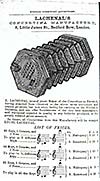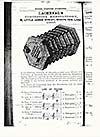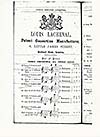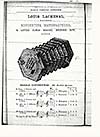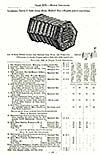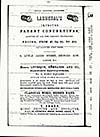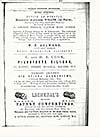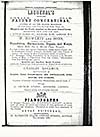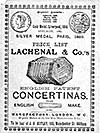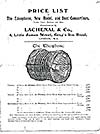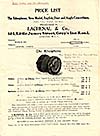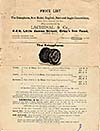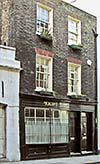Lachenal Concertina Pricelists
collected by Chris Algar
These Lachenal & Co. price lists have been collected
by Chris Algar of Barleycorn Concertinas
over the last twenty-five years. They have mostly been found in concertina cases with
few hints to date them. The earlier advertisements were supplied by Stephen Chambers.
The approximate dates ascribed to the price lists here are based on internal evidence,
as follows:
- Address:In the earliest years, Lachenal was as "8, Little James Street, Bedford Row". By
the Post Office London Directory of 1867
they had moved to "4, Little James Street, Gray's Inn Road" and a couple of decades
later were occupying "4 & 6, Little James Street, Gray's Inn Road".
- Postcode: The basic postcode areas (e.g., "W.C.") from the late nineteenth century
were augmented with numbers (e.g., "W.C.1") added in 1917.
- Telegraph Address: after they appear, all are "Lachenal, London".
- Telephone Office: no telephone listed until after the postcodes change, then
the prefix "Museum" is used until it is replaced by "Holborn".
- Awards: most lists carry dated award medals, but the latest is 1900.
- Printers' Dates: none have been found.
- Trade Mark Registration: Lachenal's
trademark,
a reedshoe with rounded tip having two screws
securing a reed, was applied for on 31 August 1878 and
the registration was published as No. 15,222 on 8 January 1879.
This device was usually stamped into the
right palm-rails of Duet and Anglo instruments, marking them as of English design with individual reeds
for each note (as opposed to German instruments with multiple reeds riveted to a single plate).
The rounded tip of the reedshoe was
the innovation which permitted rotating blades to be used to sculpt the dove-tail slots for reedshoes,
an element of Lachenal's engineering for economical volume production.
- Registered Design Registration:
Registered Design No. 129662-3 for the Edeophone (with
twelve sides) was issued to Lachenal 26 July 1889, so the Edeophone instruments should be later.
- Model Names: we can see "the People's Concertina", then the series "Paragon", "Inimitable",
"Excelsior" and "Nompariel", then the "Patent Duet" and "New Model English" instruments, then
the Edeophone and "New Model Duet", then "New Model Anglo".
- Prices: surprisingly, the variations in prices do not seem to be of much help in dating.
Robert Gaskins, Chris Algar, Randall Merris, and Wes Williams joined in the project to assign
dates to the price lists. Additional documents were contributed by Stephen Chambers, who has independently
done the most extensive work on the history of Lachenal.
-
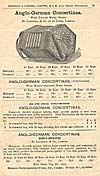 Henshaw & Loebell Concertinas Pricelist circa 1895
Henshaw & Loebell Concertinas Pricelist circa 1895
- contributed by Randall C. Merris
-
Dealer's pricelist from Henshaw & Loebell, Manchester, listing models and prices for German and Anglo concertinas,
including instruments made by Lachenal & Co. and by George Jones. Dated c. 1895 by internal evidence and
by an accompanying dated sales receipt.
- Posted 07 March 2005
-
» read full document in pdf
Do you know another resource that we should include?
Tell us about it.
Reprinted from the Concertina Library
http://www.concertina.com
© Copyright 2000– by Robert Gaskins
|

Elements from cover of a
Lachenal & Co. pricelist
published c. 1925.
Links to related documents
-
 Wheatstone English Concertina Pricelists
Wheatstone English Concertina Pricelists
- collected by Chris Algar
-
Most of these pricelists were found in old concertina cases. From internal evidence it is
possible to date the lists c. 1915 to c. 1965 (plus one very early pricelist dated 1848,
from the collection of the Horniman Museum, and a list published as an advertisement
in a trade directory in 1859). These lists contain information about Wheatstone
model numbers and descriptions which are useful to interpret the Wheatstone Concertina Ledgers.
See also Duet pricelists from Wheatstone.
See also Anglo pricelists from Wheatstone.
- Posted 15 May 2003
- » go to directory
-
 Wheatstone Anglo Concertina Pricelists
Wheatstone Anglo Concertina Pricelists
- collected by Chris Algar
-
Most of these pricelists were found in old concertina cases. From internal evidence it is
possible to date the lists c. 1910 to c. 1965. These lists contain information about Wheatstone
model numbers and descriptions which are useful to interpret the Wheatstone Concertina Ledgers.
See also English pricelists from Wheatstone.
See also Duet pricelists from Wheatstone.
- Posted 15 February 2003
- » go to directory
-
 Wheatstone Duet Concertina Pricelists
Wheatstone Duet Concertina Pricelists
- collected by Chris Algar
-
Most of these pricelists were found in old concertina cases. From internal evidence it is
possible to date the lists c. 1910 to c. 1965 (plus one very early pricelist for Double duets c. 1850).
These lists contain information about Wheatstone
model numbers and descriptions which are useful to interpret the Wheatstone Concertina Ledgers.
See also English pricelists from Wheatstone.
See also Anglo pricelists from Wheatstone.
- Posted 15 February 2003
- » go to directory
-
 Lachenal “Edeophone” Registered Design 1889
Lachenal “Edeophone” Registered Design 1889
- from Randall C. Merris
-
The registered design for the “Edeophone” 12-sided concertina, registered by
“Lachenal and Company, 4 Little James Street, Bedford Row, London, Concertina
Manufacturers.” Registered design No. 129662, Class 3; date of registration
26th July 1889.
- Posted 07 March 2005
-
» read full document in pdf
-
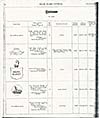 Lachenal “Reedshoe” Trademark 1878
Lachenal “Reedshoe” Trademark 1878
- from Robert Gaskins
-
Trade Marks Journal showing the “reedshoe” image registered as a trademark by
“Richard Ballinger, of and on behalf of the Firm of Lachenal and Co., 4,
Little James Street, Gray’s Inn Road, W. C., Middlesex; Concertina
Manufacturers.” Registration No. 15,222; application received 31st Aug. 1878,
publication date January 8, 1879. Stated to be not used prior to 13th Aug. 1875.
Class of goods: 9.
- Posted 07 March 2005
-
» read full document in pdf
-
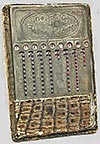 Calculate Modern Values of Historic Concertina Prices
Calculate Modern Values of Historic Concertina Prices
-
by Randall C. Merris and Robert Gaskins
-
“How much would that be in new money?”
An interactive calculator to convert sterling values from any
year 1830–1999 to the equivalent value in the year 2000.
The calculation preserves the relation between the chosen value and
“average earnings” for the two dates; this method makes it
appropriate for converting wages and capital sums, and also for
expensive discretionary products such as concertinas. The calculator deals
with both “old money” (prior to 1971) and the later decimalized
currency. It is especially useful for understanding historical documents such
as old advertisements and pricelists, and the sales prices and wages
recorded in the
Wheatstone Concertina Ledgers
from the Horniman Museum.
-
Posted 01 January 2005
-
» read full article
|


